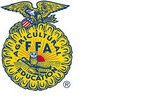FFA

The FFA Mission
The National FFA Organization is dedicated to making a positive difference in the lives of students by developing their potential for premier leadership, personal growth and careersuccess through agricultural education.
The FFA Motto
The FFA motto gives members twelve short words to live by as they experience the opportunities in the organization.
Learning to Do, Doing to Learn, Earning to Live, Living to Serve.
More About FFA
Official Organization Name
The National FFA Organization was organized as the "Future Farmers of America" in 1928 in Kansas City, Mo. In 1988, the official organization name was changed to The National FFA Organization to reflect the broadening field of agriculture, which today encompasses more than 300 careers in everything from agriscience to biotechnology to turf grass management.
Federally Chartered
In 1950, Congress granted FFA a federal charter, making it an integral, intracurricular part of public agricultural instruction under the National Vocational Education Acts. Two of the FFA top three executives are employed by the U.S. Department of Education.
FFA Structure
FFA operates on local, state and national levels. Student members belong to chapters organized at the local school level. Agricultural education instructors serve as chapter advisors. Chapters are organized under state associations headed by an advisor and executive secretary, often employees of the state department of education. States conduct programs and host annual conventions.
The National FFA Organization, governed by a Board of Directors and a Board of Student Officers, charters state associations; provides direction, programmatic materials and support; and hosts the National FFA Convention, which draws more than 51,000 attendees each fall. The National FFA Alumni's more than 40,000 members assist in the continued growth and development of active FFA programs.
Applied Learning
The agricultural education program provides a well-rounded, practical approach to learning through three components: Classroom education in agricultural topics such as plant and animal sciences, horticulture, forestry, agrimarketing, etc.; hands-on supervised agricultural career experience such as starting a business or working for an established company; and FFA, which provides leadership opportunities and tests students' agricultural skills.
Programs and Activities
The FFA programs and activities help members develop public speaking skills, conduct and participate in meetings, manage financial matters, strengthen problem-solving abilities and assume civic responsibility. Degrees earned at local, state and national levels recognize members' increasing accomplishments. Competitive events and awards programs in areas such as public speaking, commodity marketing and agriscience recognize students' achievements, encourage them to excel beyond the classroom and develop career skills. Community service programs help students contribute to society.
What is Agricultural Science Education?
The agricultural education program is built on the three core areas of classroom/laboratory instruction, supervised agricultural experience programs and FFA student organization activities/opportunities. The program is designed for delivery through these three components as follows:
Classroom/Laboratory Instruction – quality instruction in and about agriculture that utilizes a “learning by doing” philosophy.
Supervised Agricultural Experience Programs – all students are expected to have an agriculturally related work-based learning experience while enrolled in agricultural education courses.
FFA Student Organization activities/opportunities – FFA activities are an integral part of the agricultural education program that all agricultural education students should participate in if they are to fully benefit from their enrollment in the program.
A quality agricultural education program has a balanced utilization of these three core components. These components are best carried out when the following strategies are employed:
Community Based Planning– involvement of the school administration and community in the planning and coordination of the program is essential to success.
Professional Development – agriculture teachers take advantage of opportunities for professional development and growth.
Partnerships – the development of alliances with community and business leaders are essential for program success.
Marketing – every agricultural education program needs a successful marketing strategy in place to attract and retain students and the support of the community that is being served.
Learn more by visiting the National FFA Organization site at www.FFA.org
